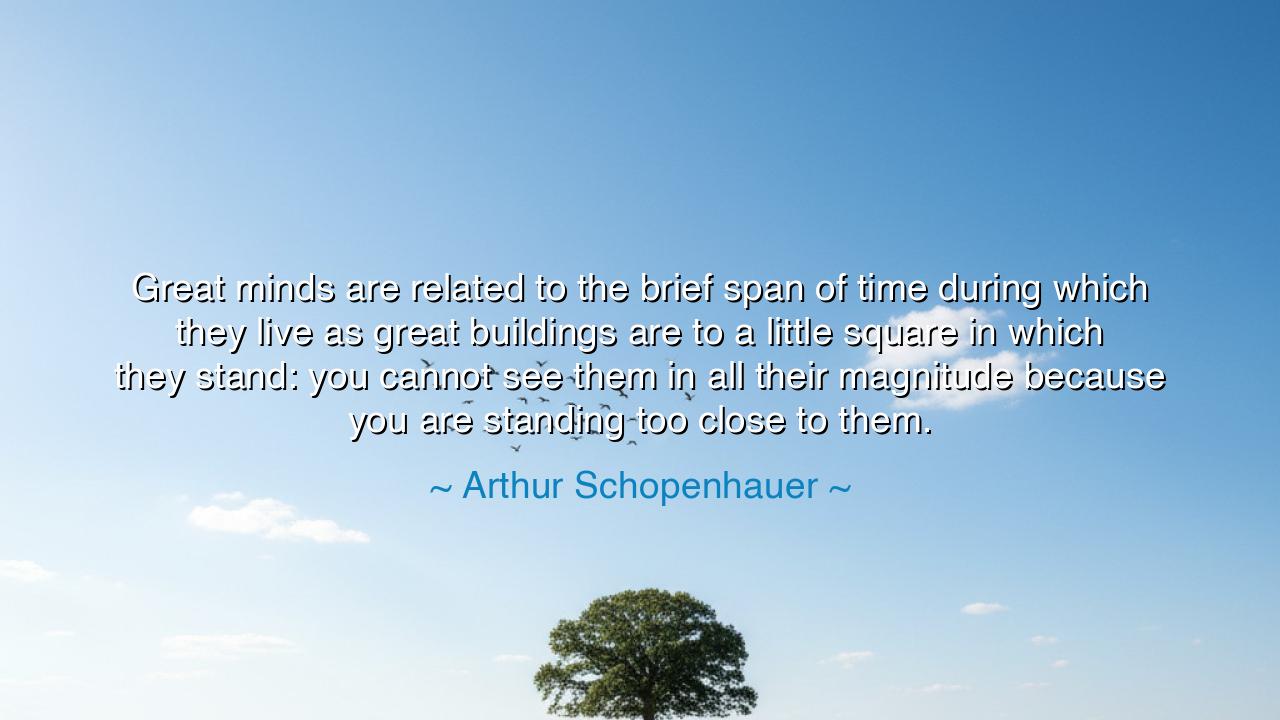
Great minds are related to the brief span of time during which
Great minds are related to the brief span of time during which they live as great buildings are to a little square in which they stand: you cannot see them in all their magnitude because you are standing too close to them.






"Great minds are related to the brief span of time during which they live as great buildings are to a little square in which they stand: you cannot see them in all their magnitude because you are standing too close to them." – Arthur Schopenhauer
So spoke Arthur Schopenhauer, the philosopher of solitude and shadow, who gazed into the heart of human understanding and saw how easily we fail to recognize greatness in our midst. When he said, “Great minds are related to the brief span of time during which they live as great buildings are to a little square in which they stand,” he was speaking of perspective, of the blindness that time casts upon those who live alongside genius. His words remind us that true greatness is rarely seen clearly by contemporaries, for the light of a great mind is often too close, too dazzling, too strange for the eyes of the age that beholds it.
The origin of this reflection lies within Schopenhauer’s Parerga and Paralipomena, a collection of essays written late in his life. By then, he had endured years of obscurity and neglect, dismissed by the intellectual world of his time. Only in his later years did the world begin to understand him — the philosopher who had walked unnoticed among them. Out of that bitter and luminous experience, he spoke these words, comparing great thinkers to majestic buildings that can only be fully appreciated from a distance. To stand too near is to lose the view; to live too close to genius is to mistake its magnitude for eccentricity or madness.
This truth repeats itself through all ages. Galileo, condemned by his own church for revealing the motion of the heavens; Vincent van Gogh, dying in poverty, his paintings unsold; Emily Dickinson, her poems unread in her lifetime; Nikola Tesla, forgotten as the world celebrated others with lesser vision. Each stood as a towering structure in a narrow square — their neighbors could not see the whole of them because they looked from too close, too soon. Only time, retreating from their presence, allowed humanity to gaze back and behold their full height. Schopenhauer’s words thus serve as a timeless lament: that the present rarely honors what the future will revere.
He understood that this blindness is not born of malice but of limitation. The human mind is bound by familiarity; what it sees daily it ceases to see truly. The extraordinary becomes ordinary through nearness. Just as one cannot admire the full grandeur of a cathedral while pressed against its walls, one cannot grasp the true stature of a great mind while it walks among ordinary men. It is only after the passage of years — when distance grants clarity — that the shape of greatness emerges in its full splendor. Time is the only architect capable of revealing the true proportions of genius.
Yet Schopenhauer’s insight is not meant to breed despair, but humility. He calls upon us to cultivate reverence for the present, to look more deeply at those who surround us. The philosopher, the artist, the scientist, the dreamer — these may seem obscure, awkward, or controversial now, but their ideas may one day reshape the world. The wise soul learns to listen without prejudice, to judge not by the applause of the crowd but by the integrity of the vision. For truth often enters the world quietly, and those who hear it first are rarely those who understand it best.
Consider how even Schopenhauer himself was misunderstood by his contemporaries. While they dismissed him as bitter and obscure, his ideas would later ignite the minds of Nietzsche, Wagner, Tolstoy, and Freud, shaping the very currents of modern thought. His prophecy fulfilled itself: those who once stood too near could not see him, but those who came generations later could see him clearly — vast, solemn, and immense, like a temple revealed through time. And so it is with all who carry a light too bright for their century; they must walk in shadow until the world grows ready to see.
So, my child of reflection, take this wisdom to heart: do not measure greatness by the nearness of the hour. When you meet those who think differently, who disturb, who question, who challenge the ordinary, resist the impulse to dismiss them. Step back, and look with the eyes of time. Likewise, if you yourself bear an idea that the world rejects, do not despair. Remember Schopenhauer’s truth — that nearness clouds perception, but distance reveals the divine design. Work faithfully, speak truthfully, and let time be your witness. For the square is small, but the building is vast, and though men may not yet lift their eyes, eternity will.






AAdministratorAdministrator
Welcome, honored guests. Please leave a comment, we will respond soon